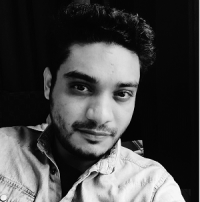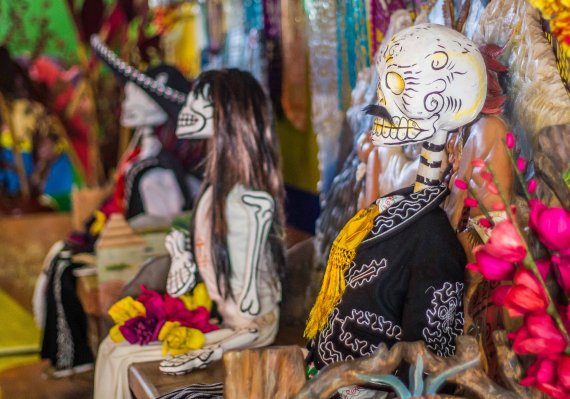Leonardo Medina Santa Cruz,
Master’s student of Environmental sciences from Mexico
‘A big day in Mexico is Dia de Muertos (literally ‘the Day of the Dead’)
, All Souls Day on 2 November. On this day we celebrate the memory of our departed loved ones. The schools don’t have classes and working people only have to work half a day. Some people, mainly in the South, make a party of it and go to a parade or festival. Others celebrate it more intimately and personally, remembering the dead and getting together with their family. An important feature of the celebration is the altar which we make for a specific person who has died. You put a picture of the person who passed away on the altar and add some of his favourite things. This can be a bottle of tequila, jewellery, flowers or a specific kind of bread. When I was in sixth grade I made an altar for my grandfather. I won the prize for the best altar in the school.’
Nathania Engelhardt,
Master’s student of Applied communication science, from Curaçao
‘Curaçao celebrates the same holidays as the Netherlands, such as King’s Day, but 2 July is Curaçao’s own festival: Dia di Himno i Bandera di Kòrsou, or the Day of the Flag and the National Anthem. That is when Curaçao celebrates the first time the Island Council met, on 2 July 1951. There are always various activities such as sports tournaments, parades and performances by bands. And there are always sales in the shops, so I often went shopping with my mother on that day. In the national parade, they have an eternal flame, just like the one for the Olympics. When I was little I was in the scouts and I was allowed to join the parade. Outstanding scouts get chosen to hoist the flag at the end of the parade. One year I was almost chosen to do it but I wasn’t tall enough. The next year my brother got to do it.’
Sarvarbek Eltazarov,
Master’s student of Environmental sciences, from Uzbekistan
‘We have multiple celebrations every year, but one of the most popular and ancient national holidays is “Navruz”, which means “new day”. We celebrate it on the 21st of March, the first day of spring, when all plants and trees blossom. The most memorable thing related to the Navruz celebration is visiting my grandparents when I was a child. They live 1000 km away from my home. At Navruz many Uzbek families come together and prepare national dishes such as Sumalak and Kuk-Somsa. Sumalak tastes like molasses-flavoured cream of wheat, and is made of flour and sprouted wheat grains. Sumalak is cooked slowly over a wood fire, sometimes with the addition of spices.’
Shameem Parayil,
Master’s student of Food technology, from India

‘Diwali is the festival of light. The festival signifies the victory of light over darkness, good over evil, or knowledge over ignorance
. It is celebrated between the middle of October and the middle of November depending on the phase of the moon. Everyone is free on this day and the celebration starts early in the morning. People invite their family and friends, we wear traditional clothes, eat special dishes and do pujas. Pujas are a form of worship of the gods. In the evening we light a lot of firecrackers and there are diyas (lights) shining on housetops, outside doors and windows, around temples and other buildings in the streets. One of memorable moments I had during Diwali was the time I went to the nearest hill station with my parents and siblings. We had a picnic and in the evening we had a camp fire and enjoyed Diwali with a really good view of the city.’
Sotiris Koutrotsyos,
Master’s student of Environmental Sciences, from Greece

‘On the 25th of March we have a celebration with a double meaning. We celebrate the Greek revolution against the Ottoman Empire in 1821, liberation day, and the religious festival of the Annunciation. Because on this day the angel Gabriel told Mother Mary that she would give birth to Jesus Christ. Liberation day is very important for the Greeks. We were under Turkish conquest for 400 years. This is the biggest scar on the Greek nation. During Liberation Day a parade takes place through the main streets of all big cities and villages. The navy, army, military force, fire brigade and students all participate in this parade. The six young students with the best grades are allowed to walk in the first two rows of the parade and one may hold the flag. I was an excellent student for four years. From 14 to 17, I could march in the first two rows of the parade.’
Sasiwimon Siricharoen,
Master’s student of Plant sciences, from Thailand

‘Every year on the traditional Thai new year we have a huge water fight. The celebrations are from 13 to 15 April, and it’s called the Songkran festival. These three days are national holidays so everyone is free to celebrate these special days. April is one of the hottest months in Thailand so in the past people poured some water on each other for cooling. Nowadays it turned into a big water fight! People use water pistols and throw water on everyone, everywhere. I come from Bangkok and I used to celebrate Songkran on the Khaosan road. This is a popular place for tourist and backpackers. They closed the whole street and everyone who put a foot outside their house got wet. It is nice to see everyone enjoying the festival and feeling happy.’

